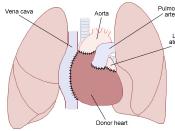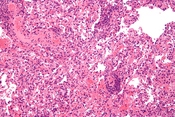Mordern science has been changing our world every time something called a "miracle" happens. It has brought drastic changes in medical science. A person gets new hope in their life and they find a little bit more time to survive in the world. Actually my topics are related to heart transplants. It is a modern surgery for the heart patient. But this heart transplant is not vulnerable to be in attacked by cold virus. So my topics will stress more about how cold virus affect heart transplant. Beside this, my thesis concern will be how it attacks and how we can prevent the virus that endangers heart transplant.
Scientists say that many heart transplant failures in children appear to be caused by a common cold virus that infects the organ. This same virus also infects other part of our body. If it attacks during heart transplant, then it will spoil the heart but also the lung, kidney and other organs that contribute to ordinary heart disease.
The cold virus germ known as adenovirus can cause the common child hood disease pinkeye. More rarely, the virus has been implicated in a heart inflammation known as myocarditis. The adenovirus appears to attack the lining of heart arteries, leading to blockages. As a result, trasplant patients can die or need a new transplant when their body rejects the new transplant. But new research has found that other virus beside adnovirus may also affect the heart transplant.
Prevention of cold virus effect during heart transplant is also possible. Transplant patients must take drugs to suppress their immune systems and prevent organ rejection, and that makes them vulnerable to cold virus. One of the Baylor researchers, pediatric cardiologist Dr. Jeffrey Towbin, said, "then the vaccine should be produced again, and an antibody drug could...


